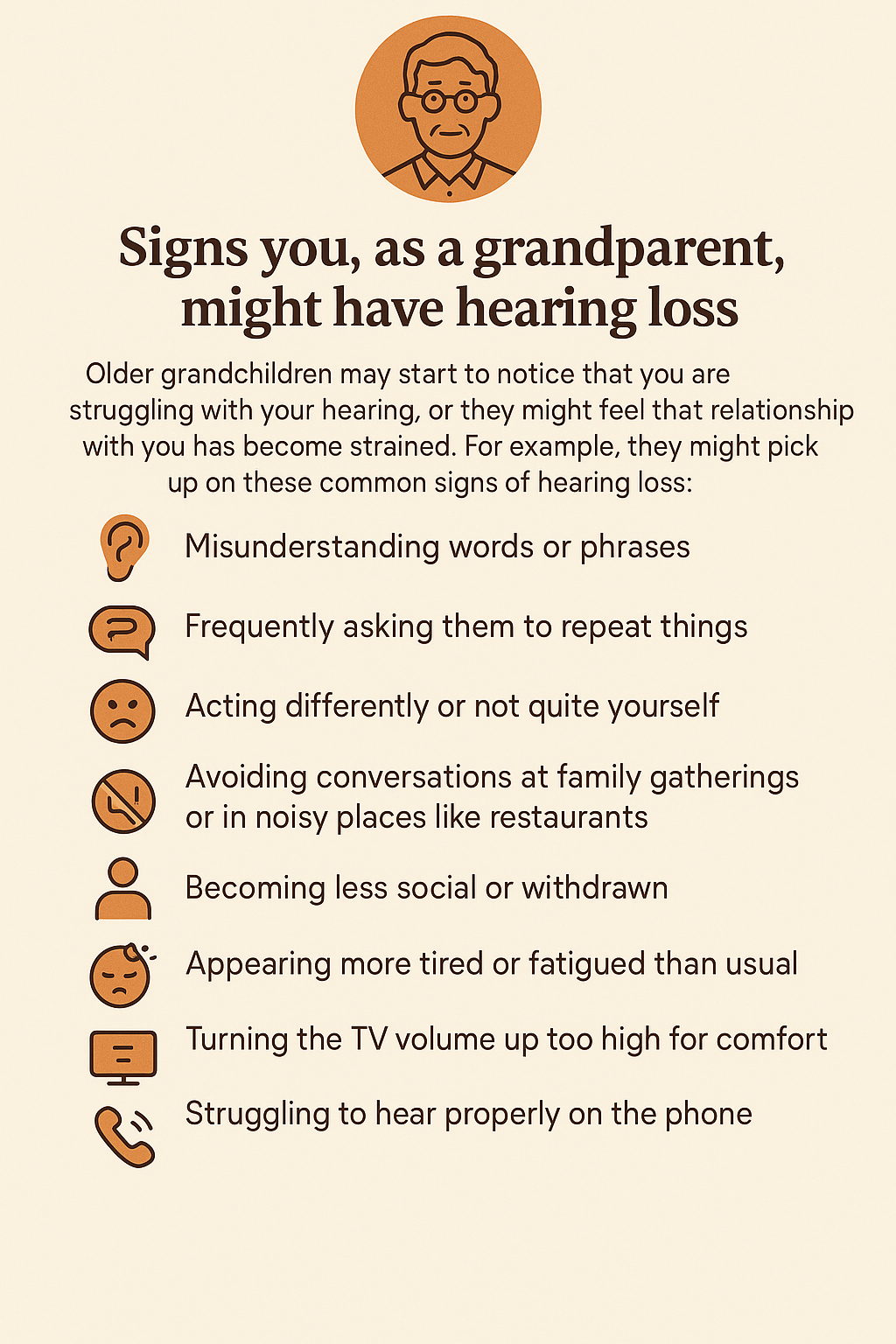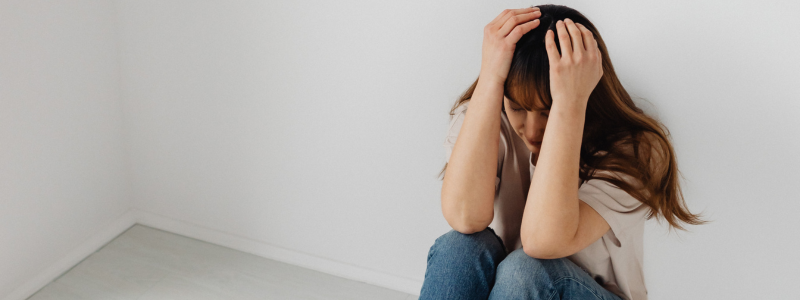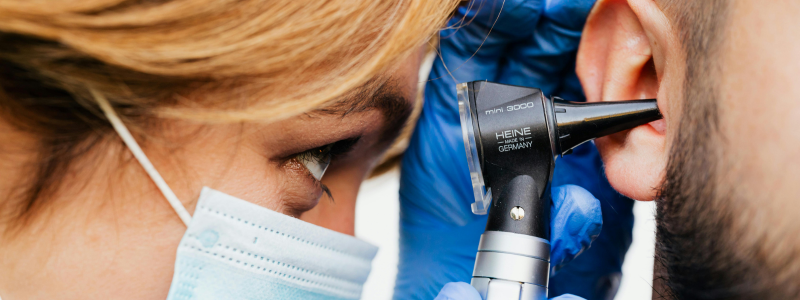
Head of Online Medical Content

Audiology Expert

I Can't Hear My Grandchildren. Do I Have Hearing Loss?
What to do if you find it difficult to hear the grandkids
Overview | Is everything more muffled? | The challenge with children's voices | Common signs you might have hearing loss | How to communicate with your grandchildren | Tips for better communication | When to seek help | Don't ignore it | Summary
Last Hearing Aid UK Update:
Overview
Many grandparents struggle to hear their grandchildren due to age-related hearing loss, which affects high-pitched sounds. This can cause frustration and social withdrawal.
Signs include asking for repeats and avoiding noisy settings. Communication improves when children face you, speak clearly, and the background noise is reduced. Hearing tests and modern hearing aids can help grandparents reconnect and enjoy family time.
Is your hearing becoming muffled? Especially when trying to hear children?
The excited squeals and the whispered secrets are all the sounds of childhood and the sounds of grandchildren. But for many grandparents, these moments can become muffled, and the ability to fully participate can be significantly reduced.
Age-related hearing loss, or presbycusis, is a common condition affecting a huge portion of older adults in the UK.
It often creeps in gradually, and you might find yourself turning up the TV a bit louder or asking people to repeat themselves more often. However, the real impact is often felt most in conversations with grandchildren.
Struggling to hear your grandchildren can be both upsetting and isolating. If you, as a grandparent, are having trouble hearing and notice changes in how you interact or communicate, it might be a sign of hearing loss.
In this article, we talk about the effects of hearing loss on you, your family, and your grandchildren, along with the signs to look out for, useful communication strategies, and when to seek help.
The difficulty with children's voices and family gatherings
Children's voices are higher-pitched and can be particularly difficult to understand and hear. What should be an easy conversation can become strained, and the frustration isn't just with you.
Grandchildren may become discouraged, feel disconnected, and start to withdraw from communicating.
Family gatherings might also become overwhelming, as the chaos of multiple conversations, laughter, and background noise creates a barrier, isolating you as grandparents. The fear of mishearing can lead to a retreat from actively participating.
Related reading: Age-related hearing loss
Signs you, as a grandparent, might have hearing loss
Older grandchildren may start to notice that you are struggling with your hearing, or they might feel that their relationship with you has become strained. For example, they might pick up on these common signs of hearing loss:
- Misunderstanding words or phrases
- Frequently asking them to repeat things
- Acting differently or not quite yourself
- Avoiding conversations at family gatherings or in noisy places like restaurants
- Becoming less social or withdrawn
- Appearing more tired or fatigued than usual
- Turning the TV volume up too high for comfort
- Struggling to hear properly on the phone

The emotional toll of hearing loss
The emotional toll is significant, as grandparents, you may feel a profound sense of loss for the sounds that are no longer fully accessible. Feelings of inadequacy and isolation can take hold, impacting your overall well-being.
It's not just about missing words; it's about feeling less 'in the thick of it' and more of an observer.
Hearing loss can affect the entire family dynamic. Children may feel hurt or confused by your seeming disinterest, not realising it's a matter of hearing, not attention.
Parents may find themselves acting as constant intermediaries, repeating conversations and feeling the strain of bridging the communication gap.
Hearing loss is manageable and a common part of ageing
But this doesn't have to be the case; hearing loss is not an obstacle that can't be tackled. It's a medical condition, and like many others, it can be successfully managed. The first step, and often the hardest, is recognising the problem and seeking professional help.
Beyond hearing aids, if needed, there are other strategies that your family can employ. Creating a quiet environment for conversations, speaking clearly, staying facing you, and using visual cues can all help bridge the communication gap.
Patience, understanding, and a willingness to adapt are also key.
Related reading: Communication strategies for those with hearing loss
How to talk to your grandchildren about hearing loss
Children often have a habit of swallowing their words or blending them together, and their voices are usually softer and higher-pitched.
Their speech patterns can make it difficult to understand them, but when combined with hearing loss, particularly age-related hearing loss, which tends to affect higher frequencies, it becomes even more challenging.
Teaching them the most effective way to communicate with you will require patience and plenty of repetition, but it’s definitely worth the effort. Share the tips below, and before long, it will become second nature to them.
Tips for better conversations with your grandchildren
- Explain your hearing loss: Let them know it’s harder for you to hear them. Show them your hearing aids (once diagnosed and if you now wear them) and explain that your ears don’t work as well as theirs.
- Ask for their attention: Tell them it’s easier for you to hear if they get your attention before speaking. This helps you focus on what they’re saying and makes understanding the conversation easier.
- Ensure they’re facing you: Let them know that seeing their lips helps you hear better.
- Minimise background noise: Ask them to lower the volume of music or move away from noisy areas. Good lighting helps with lip-reading, so encourage bright spaces when talking.
- Encourage turn-taking: Teach them to wait their turn to speak. Children often get excited and speak over one another, but taking turns will help you follow the conversation more easily.
- Speak at a normal pace: Ask them to speak clearly and at a normal pace. Shouting or speaking too quickly can make it harder for you to understand.
- Ask for clarification if you miss something: If you don’t catch a word, don’t hesitate to ask them to clarify or rephrase.
- Get down to their level: Engaging in their activities, like playing with toys, will make it easier for them to communicate with you.
Seeking professional help
For grandparents, taking that first step can be transformative. Hearing tests are readily available on the NHS and through private providers.
An audiologist can assess the extent of the hearing loss and recommend appropriate solutions based on your needs and preferences. For many, hearing aids can make a remarkable difference.
Modern devices are sophisticated, discreet, and tailored to unique needs. They can amplify high-pitched voices, filter out background noise, and restore the joy of clear communication.
Don't let hearing loss stop you from reconnecting with grandchildren
Age-related hearing loss is a natural part of life, but it doesn't have to isolate you from your grandchildren or family. By acknowledging the challenge and seeking the right support, you can reclaim those precious connections.
Take the first step today and speak to an audiologist, explore solutions, and consider how small changes can make a big difference. Contact us today to schedule a free hearing assessment, either in a local clinic or at your home with one of our professional audiologists.
Summary
Age-related hearing loss often makes it difficult for grandparents to hear the high-pitched voices of their grandchildren, leading to frustration, misunderstandings, and social withdrawal.
Common signs include frequently asking for repetition, raising the TV volume, and avoiding noisy environments. Communication can be improved by encouraging children to face the listener, speak clearly, and reduce background noise.
Professional hearing assessments and hearing aids offer effective solutions, helping grandparents stay connected and engaged with their families. Early recognition and support can greatly enhance quality of life and family relationships.
Why Choose Us?
- FREE Hearing Tests
- Best Hearing Aids and Prices
- FREE Aftercare for Life
- FREE Home Visits
- 200+ Local Audiologists
- 60 Day Money Back Guarantee
Struggling to hear grandchildren? You might have hearing loss
Take action!
You don’t have to miss out on the special moments with your grandchildren. If you’ve found yourself thinking, “I can’t hear my grandchildren like I used to,” it may be time to take that first gentle step.
Book a free hearing assessment today, at your local clinic or in the comfort of your own home, and start reconnecting with the voices that matter most. We’re here to help, whenever you're ready.
Other hearing loss articles you might like...
 Hearing aid stigma
Hearing aid stigma  How to tell if hearing loss is permanent or temporary
How to tell if hearing loss is permanent or temporary  Ways to keep your ears healthy
Ways to keep your ears healthy Our specialist service includes:
Do not spend hundreds of pounds without getting a second opinion from us.
Please call us on 0800 567 7621
 Not only are the prices great, but the service is fantastic! Many thanks to your team.
Not only are the prices great, but the service is fantastic! Many thanks to your team.Watch the NHS hearing loss video below
What's included in our hearing aid prices?
Other pages you might find useful
FAQs
In general, any audiologist will always recommend to you the hearing aid model that best suits your needs. Here is a useful checklist to make sure that is the case.
- Audiologist's level of knowledge: The audiologist you have seen will hopefully have a wide knowledge of all available hearing aids; however, some will only be familiar with a small number of brands and, therefore, may not really be in a position to know which model is the best for you. It is OK to challenge their recommendation and ask them to justify why this particular brand is the one for you.
- Do research: Read about the hearing aid that was recommended. Does it seem like it will suit your lifestyle? Does it have more or fewer features than you need?
- Be aware of sales targets: Many high street retailers have specific tie-ins to a particular manufacturer/brand. The hearing aid they have suggested may still be the correct one for you, but do your research so that you know why they might have recommended it.
If you have significant hearing loss in both ears, you should be wearing two hearing aids. Here are the audiological reasons why:
Localisation: The brain decodes information from both ears and compares and contrasts them. By analysing the minuscule time delays as well as the difference in the loudness of each sound reaching the ears, the person is able to accurately locate a sound source.
Simply put, if you have better hearing on one side than the other, you can't accurately tell what direction sounds are coming from.
Less amplification is required: A phenomenon known as “binaural summation” means that the hearing aids can be set at a lower and more natural volume setting than if you wore only one hearing aid.
Head shadow effect: High frequencies, the part of your hearing that gives clarity and meaning to speech sounds, cannot bend around your head. Only low frequencies can. Therefore, if someone is talking on your unaided side, you are likely to hear that they are speaking, but be unable to tell what they have said.
Noise reduction: The brain has its own built-in noise reduction, which is only really effective when it is receiving information from both ears. If only one ear is aided, even with the best hearing aid in the world, it will be difficult for you to hear in background noise as your brain is trying to retain all of the sounds (including background noise) rather than filtering them out.
Sound quality: We are designed to hear in stereo. Only hearing from one side sounds a lot less natural to us.
Fancy some further reading on this topic? You can read about why two hearing aids are better than one in our article, hearing aids for Both Ears, here
For most people, the main benefit of a rechargeable hearing aid is simple convenience. We are used to plugging in our phones and other devices overnight for them to charge up. Here are some other pros and cons:
For anybody with poor dexterity or issues with their fingers, having a rechargeable aid makes a huge difference, as normal hearing aid batteries are quite small and some people find them fiddly to change.
One downside is that if you forget to charge your hearing aid, then it is a problem that can't be instantly fixed. For most, a 30-minute charge will get you at least two or three hours of hearing, but if you are the type of person who is likely to forget to plug them in regularly, then you're probably better off with standard batteries.
Rechargeable aids are also a little bit bigger and are only available in Behind-the-Ear models.
Finally, just like with a mobile phone, the amount of charge you get on day one is not going to be the same as you get a few years down the line. Be sure to ask what the policy is with the manufacturer's warranty when it comes to replacing the battery.
For most people, the answer is yes. But it's never that simple.
The majority of hearing problems affect the high frequencies a lot more than the low ones. Therefore, open fitting hearing aids sound a lot more natural and ones that block your ears up can make your own voice sound like you are talking with your head in a bucket. Therefore, in-ear aids tend to be less natural.
However, the true answer is we can't tell until we have had a look in your ears to assess the size of your ear canal, and until we have tested your hearing to see which frequencies are being affected.
People with wider ear canals tend to have more flexibility, also there are open fitting modular CIC hearing aids now that do not block your ears.
There is also the age-old rule to consider, that a hearing aid will not help you if it's sat in the drawer gathering dust. If the only hearing aid you would be happy wearing is one that people can't see, then that's what you should get.
Most people can adapt to any type of hearing aid, as long as they know what to expect. Have an honest conversation with your audiologist as to what your needs are.
Generally speaking, six or more. Unless it's none at all. The number of channels a hearing aid has is often a simplistic way an audiologist will use to explain why one hearing aid is better than another, but channels are complex, and it is really not that straightforward. Here are some reasons why:
Hearing aids amplify sounds of different frequencies by different amounts. Most people have lost more high frequencies than low, and therefore need more amplification in the high frequencies. The range of sounds you hear is split into frequency bands or channels, and the hearing aids are set to provide the right amount of hearing at each frequency level.
Less than six channels, and this cannot be done with much accuracy, so six is the magic number. However, a six-channel aid is typically very basic with few other features and is suitable only for hearing a single speaker in a quiet room. The number of channels is not what you should be looking at; it's more the rest of the technology that comes with them.
As a final note, different manufacturers have different approaches. One method is not necessarily better than any other. For example, some manufacturers have as many as 64 channels in their top aids. Most tend to have between 17 and 20. One manufacturer has no channels at all.
Manufacturer's warranties typically last between 2-5 years, depending on the brand and model, and cover defects in materials and workmanship. This includes repairs for component failures, electronic malfunctions, and manufacturing defects, but excludes damage from misuse, accidents, or normal wear. Most manufacturers also include loss and damage insurance for the first year.
We handle all warranty claims on your behalf, liaising with manufacturers and ensuring you get replacement devices quickly when needed. This comprehensive warranty coverage, combined with our lifetime aftercare, gives you complete peace of mind.
Our hearing tests are completely free, whether at our clinics or in your home. Unlike other providers who charge £30-£100 for home visits, we believe hearing healthcare should be accessible without financial barriers. Our comprehensive assessments include examination by a registered audiologist, audiogram results, and personalised recommendations.
All testing, future adjustments, and ongoing support are included at no extra cost. While NHS tests are also free, typical 6-week waiting periods often lead people to seek immediate private testing. We provide prompt, professional assessments that fit your schedule and budget.
Yes, we offer completely free home visits throughout the UK, and this service is included in our prices with no additional charges. Home visits are particularly valuable for people with mobility issues, busy schedules, or those who simply prefer the comfort and convenience of their own environment.
Our audiologists can conduct full hearing tests, fit hearing aids, and provide ongoing support in your home. This service sets us apart from many providers who either don't offer home visits or charge extra for them.
We can offer prices up to 40% lower than high street retailers because of our business model. As a network of 200+ independent audiologists, we don't have the massive overheads of large retail chains - no expensive high street premises, no sales targets pushing audiologists to sell the most expensive options, and no costly marketing campaigns.
However, we maintain the same buying power as the big chains because we purchase on behalf of our entire nationwide network. This means you get access to the same premium hearing aids with professional service, but at genuinely competitive prices.
We offer a comprehensive 60-day money-back guarantee, which gives you twice the industry standard time to properly assess whether your hearing aids are right for you. This extended period recognises that adjusting to hearing aids takes time, and your brain needs several weeks to adapt to the amplified sounds.
Unlike many providers who offer just 30 days, we believe 60 days gives you the confidence to test your hearing aids in all the situations that matter to you - from quiet conversations at home to busy restaurants and outdoor activities.
Ask the Experts
6 Morton Lane
Walkwood
Redditch
Worcestershire
B97 5QA
Latest Launch
When we refer to a product as 'Latest Launch', we mean it is the latest to be released on the market.
New
When we refer to a product as 'New', we mean that the product is the newest hearing aid model on the market.
When we refer to a product as 'Superseded', we mean that there is a newer range available which replaces and improves on this product.
Older Model
When we refer to a product as an 'Older Model', we mean that it is has been superseded by at least two more recent hearing aid ranges.
